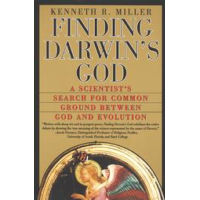Finding Darwin's God
reviewed by John Scull

Miller,
Kenneth R., Finding Darwin's God: A Scientist's Search
for Common Ground Between God and Evolution. New York:
Cliff Street Books, 1999. ISBN: 0060930497
For someone like myself, trained as a scientist but plagued
by a yearning for the truths of religion, this book is a
gift. Like the universe story of Thomas Berry and Brian
Swimme, this well-written volume provides a vision that
includes both scientific and spiritual ways of knowing.
Along the way it dispels a great deal of nonsense that has
been written about the theory of Evolution both by advocates
and opponents.
The value of this book for ecopsychology, besides the numerous
interesting stories about the diversity of life and the
excitement of science, may reside in its claim that a belief
in materialist science is consistent with a view of Nature
as a magical, conscious expression of the mind of God, the
ground of all being. Miller's presentation of evolutionary
theory in a religious context is refreshingly undogmatic.
Author Ken Miller is a cell biologist and professor of biology
at Brown University. In addition to research, teaching,
and textbook writing, he seems to have spent a great deal
of time in public debate with Creationists. Miller sees
nothing contradictory in being a cell biologist who believes
in God.
In the first two chapters of this very readable book, Miller
introduces the theory of Evolution. The next three chapters
are devoted to refuting the various forms of Creationism.
He manages to demolish the various creationist positions
in a way that would satisfy most scientists and philosophers,
but I doubt if he would convince anyone already committed
to one of these Creationist views.
He then has a wonderful chapter where he lumps together
all the radical Darwinists and advocates of Evolution in
one basket, ignoring their heated debates and personal differences
with each other. He tars Dawkins, Dennett, Gould, Wilson,
Lewontin, and Pinker with the same brush. Miller expresses
great admiration and total agreement with their science
but he deplores their unscientific extensions of Darwinism
beyond the data of biology and paleontology to human culture
and society, and especially to religion.
Religion has tried to explain the unknowns in nature and,
as a result, has steadily retreated before the advance of
science. Religion as a "default explanation" is
a losing proposition. The next chapter discusses how in
the last century physics has discovered that at the quantum
level uncertainty is inherent in the structure of reality.
Modern physics tells us that some things are not simply
yet to be known, they are genuinely indeterminate and unknowable.
Miller cogently explains how this quantum uncertainty is
amplified by living beings, where random and unpredictable
changes at the molecular level are translated into the mutations
that lead to the variety and richness of life. He also suggests
that this uncertainty in genetics and nervous systems provides
a way for God to intervene in history without violating
natural laws.
In the two final chapters Miller discusses the interesting
observation that these writers, Creationists and Evolutionists
alike, have a basic assumption in common. They all agree
that evolution and religion can't both be true. He makes
a cogent case that this position is illogical, whether it
comes from Creationist Christians or atheist materialist
scientists. The theory of Evolution is not about religion
and the Book of Genesis is not about science.
What kind of God can an evolutionary biologist believe in?
A God who created the universe. Miller ends the book with
a passage from the closing chapter of Darwin's Origin of
Species:
"There is a grandeur in this view of life; with
its several powers having been originally breathed by
the Creator into a few forms or into one; and that, whilst
this planet has gone cycling on according to the fixed
law of gravity, from so simple a beginning endless forms
most wonderful and most beautiful have been, and are being
evolved."
Finding Darwin's God is an interesting and enjoyable antidote
both for Dennett's "universal acid" of Evolution
and the willful ignorance of Creationism. Spirituality and
science need not be in conflict, they are asking different
questions and finding different answers about the same reality.
|